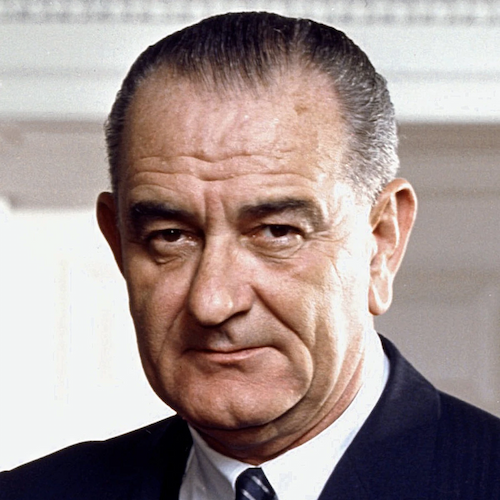Lyndon Baines Johnson, often called “LBJ,” was the 36th President of the United States from 1963 to 1969. He was Vice President when John Kennedy was assassinated. He is remembered for his work to pass the Civil Rights Act of 1964 and for escalating American involvement in the Vietnam War.
Early Life
Johnson was born on August 27, 1908, near Stonewall, Texas. His mother, Rebekah was one of the few college-educated women in the area and she passed her strong beliefs in education to Lyndon. He attended Southwest Texas State Teachers College (now Texas State University). He was a teacher at a Mexican American school, where the extreme poverty deeply affected him.
After college, he was appointed head of the Texas National Youth Administration. He married Claudia “Lady Bird” Taylor in 1934 and the couple had two children. In 1937, Lady Bird’s father lent him the money to run for the U.S. House of Representatives on a New Deal platform. He served six terms in the House and then went on to the U.S. Senate from 1949 to 1961, the last five years as Majority Leader.
Presidency
Immediately after Kennedy died, Johnson was sworn into office while flying back to Washington, D.C. on Air Force One. He appointed the Warren Commission to investigate the assassination.
He continued the initiatives started by his predecessor. He used the skills he learned in Congress to pass a long list of legislative programs. He declared the “War on Poverty” as part of his vision for a “Great Society.” He pushed legislation attacking illiteracy, unemployment, healthcare disparities, and racial discrimination.
He signed the Civil Rights Act of 1964, the Voting Rights Act of 1965, the Fair Housing Act of 1968, and legislation creating Medicare and Medicaid. He also signed legislation creating Headstart, the Corporation for Public Broadcasting and the Department of Housing and Urban Development. The Clean Air Act and the Clean Water Act formed the legal basis of the modern environmental movement.
Nevertheless, there were riots in the inner cities. He increased the number of American troops in Vietnam to more than 500,000, sparking widespread anti-war protests. Facing rising social unrest, Johnson shocked the country in March 1968 when he announced, “I shall not seek, and I will not accept, the nomination for my party for another term as your president.”
Death
Johnson retired to his LBJ Ranch in Stonewall, Texas. He died suddenly of a heart attack on January 22, 1973. The Lyndon Baines Johnson Library and Museum at The University Texas at Austin, and the Lyndon B. Johnson National Historical Park were created in his honor.






